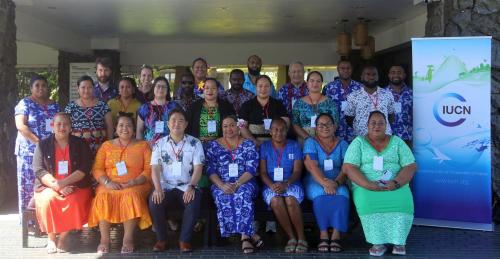
https://iucn.org/news/202504/iucn-launches-project-combat-marine-plastic...
The workshop brings together government representatives from Samoa, Tonga, and Vanuatu, alongside stakeholders from the private sector, civil society organisations, development partners, and regional agencies. The project is generously supported by the Ministry of Oceans and Fisheries of the Republic of Korea.
“Through this five-year initiative, focusing on Samoa, Vanuatu, and Tonga, we aim to strengthen national capacities, promote circular economy practices, and protect sensitive marine environments from the threats of plastic waste. The Republic of Korea is proud to contribute to global efforts to achieve the Sustainable Development Goals and remains committed to working closely with Pacific Island countries and international partners such as IUCN”, highlighted Mr Joonyoung Ahn, 1st Secretary / Maritime and Fisheries Attache, Embassy of the Republic of Korea.
Plastic pollution presents a severe threat to marine ecosystems and to the livelihoods and economies of Pacific Small Island Developing States (SIDS). Plastic accounts for up to 17% of waste generated in the Pacific region, second only to organic material, with an estimated 311,000 tonnes produced annually near coastlines, of which approximately 73% is at risk of leaking into the ocean through littering, dumping, or being carried by the wind (APWC, 2020). Each year, millions of tonnes of plastic enter the world’s oceans, devastating marine biodiversity and undermining community well-being and economic resilience. In response, this IUCN-led initiative will implement upstream, circular economy solutions to reduce plastic pollution, focusing on key sectors such as fisheries, tourism, and waste management.
Delivering the opening address, Ms Leituala Kuiniselani Toelupe Tago, Regional Director of IUCN Oceania, emphasised that "the urgency of this issue cannot be overstated, given the impacts of plastics pollution; and more importantly the interconnected environmental challenges of climate change, biodiversity loss, and pollution, or the Triple Planetary Crisis! It is therefore incumbent for us to take decisive action, towards developing sustainable, upstream circular solutions, that address our climate, biodiversity and pollution challenges. Our engagement with the representatives of the target countries, this week, will allow us to better understand their needs and priorities, as it relates to reducing plastic pollution and its impacts on marine biodiversity inclusive of sensitive coastal ecosystems to drive project implementation over the next 3 years.”
This project complements the mandate and ongoing work of the Secretariat of the Pacific Regional Environment Programme (SPREP), which leads regional coordination on waste management and pollution control. From IUCN’s perspective, it is imperative that there is “…alignment with our regional policy direction and in coordination with SPREP as the CROP technical lead on waste management and pollution control” Ms. Toelupe Tago continued.
Guided by regional policy frameworks, the project will ensure that activities in Samoa, Tonga, and Vanuatu are harmonised with wider Pacific efforts to tackle plastic pollution. This close collaboration and realisation of synergies across organizations and partners will foster greater coherence, avoid duplication, and leverage regional expertise and partnerships.
Building on the success of the Plastic Waste-Free Islands programme in Fiji, Samoa and Vanuatu, this new phase expands to include Tonga, enabling participating countries to apply practical, science-based solutions for healthier marine environments. The programme focuses on five core areas: strengthening private sector engagement, enhancing regulatory and policy environments, promoting behaviour change, building knowledge and capacity, and improving stakeholder coordination.
Over the next two days, the workshop will facilitate the development of actionable national plans, aligned with IUCN’s Blueprint for addressing marine plastic pollution. These plans will support national, regional, and global objectives, including contributions to the Global Plastics Treaty and the Sustainable Development Goals.
As the world’s largest and most diverse environmental network, IUCN’s ability to convene governments, civil society, private sector actors, and indigenous and local communities is key to advancing nature-based solutions. Through this initiative, IUCN seeks to empower Pacific Island countries to lead resilient, transformative responses to plastic pollution.
The inception workshop marks the beginning of the four-year programme, which will run until 2028, supporting Pacific Island nations in safeguarding marine biodiversity and promoting sustainable, ocean-based economies.









